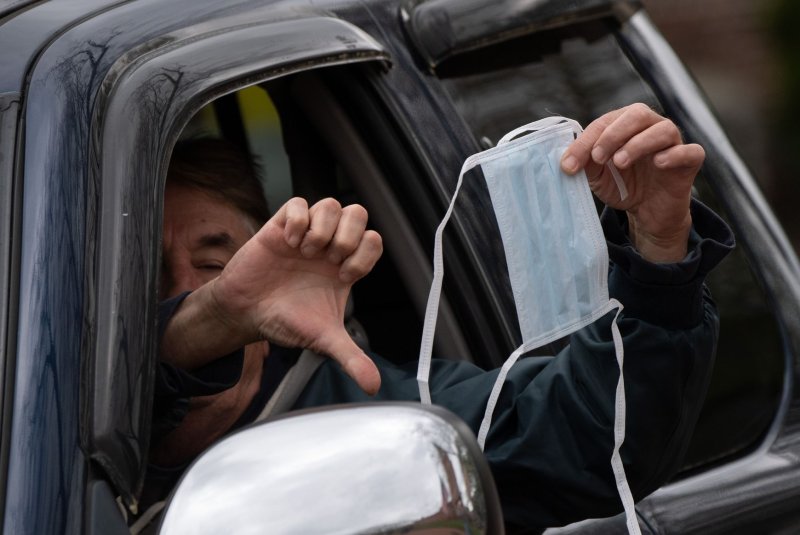A man holds a mask from his vehicle during a car protest near the state capitol building in Annapolis, Md., in April 2020 to reopen Maryland and end the stay at home order imposed during the COVID-19 pandemic. File Photo by Kevin Dietsch/UPI |
License Photo
Aug. 9 (UPI) -- The COVID-19 pandemic has taxed national healthcare systems, stunted local economies and overburdened global supply chains, but according to a new study, the crisis has also destabilized the relationship between citizens and state.
According to a new survey, published Monday in the journal Psychological Science, the pandemic's psychological toll, including frustrations with shifting public health policies, has motivated citizens to engage in protest or political violence.
"The pandemic has disrupted our normal way of living, generating frustrations, unprecedented social exclusion and a range of other concerns," study co-author Henrikas Bartusevičius said in a press release.
"Our investigations show that the psychological toll of living through a pandemic also stoked anti-government and anti-systemic attitudes that led to political violence in a number of countries," said Bartusevičius, a researcher with the Peace Research Institute Oslo in Norway.
For the survey, researchers asked some 6,000 adults from the United States, Denmark, Italy and Hungary how the COVID-19 pandemic had impacted their health, finances, relationships and rights.
Survey respondents were also quizzed about dissatisfaction with their societies and governments, as well as their willingness to engage in protest or political violence.
Survey responses revealed a correlation between the pandemic's psychological burden and a person's propensity for political violence.
The researchers found respondents negatively affected by the pandemic were not more likely to participate in peaceful forms of activism.
"We were also surprised to find that COVID-19 burden does not need additional triggers to motivate political violence," said Bartusevičius. "It is seemingly enough on its own."
The pandemic has impacted more than just human health and job security. Lockdown measures, mask mandates and social-distancing rules have all exacerbated the health crisis' psychological toll.
In the United States, survey responses suggest the pandemic's psychological burden motivated many to participate in violence during the Black Lives Matter protests and counterprotests.
"This is the first time in the modern era that highly individualized Western democracies have faced a major pandemic," study co-author Michael Bang said in a press release.
"Our research presents one of the first pieces of evidence on the disruptive potential of pandemics and associated lockdowns," said Peterson, a researcher at Aarhus University in Denmark.
Authors of the new study suggest a government's programmatic responses to the pandemic should focus on not only address the crisis' effects on human and economic health, but also on repairing the relationship between citizens and the state.















